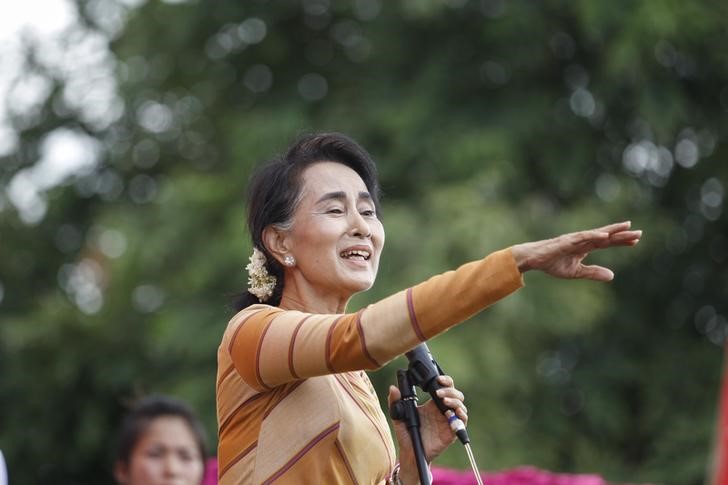By Aung Hla Tun
NAYPYITAW (Reuters) - Myanmar's main opposition party has launched an election manifesto that pledges to retain a "dignified" role for the military as a defender of democracy and consolidate government ministries to save costs.
Aung San Suu Kyi's National League for Democracy (NLD) published the 28-page document late on Monday ahead of a Nov. 8 election in which it is expected to perform well after decades on the political sidelines.
The election marks a major shift in Myanmar's political landscape, giving a platform to democratic activists crushed during a half-century of military rule that ended in 2011.
Though direct military rule has ended, it retains a powerful political role and a veto over changes to a constitution drafted under its direction, which bars Suu Kyi from becoming president.
Despite that, the NLD indicated a softer line towards the armed forces, or "Tatmadaw", under which it suffered years of persecution.
It said the Tatmadaw was an "essential" institution that "shall be dignified forces that shall defend the democratic practices".
The manifesto is short on specifics but pledges to make the military "strategically efficient", equip it with advanced technology and include it in the executive system.
It suggests a return to a more conciliatory position by Suu Kyi, who took aim a few months ago at Myanmar's top general after armed forces lawmakers rebuffed NLD attempts to change the constitution to remove their parliamentary veto.
The NLD ended its boycott of the military dominated political system in 2012 when it won dozens of seats in by-elections.
The NLD won an election in 1990 with a landslide but the junta did not recognize the result.
Though it may win most seats in the upcoming election, there are no guarantees the NLD would lead the executive.
The president, who is chosen in a parliamentary vote that includes the military, chooses his or her own cabinet, not necessarily from among political parties.
In a video message to open the campaign last week, Suu Kyi said a smooth transition was "almost as important" as the election being free and fair.
Despite the popularity of a party built around Suu Kyi's image as a hero of democracy, it has been criticized for a lack of inclusivity and for being vague about how it would govern.
It pledged to create farmers' unions, scrutinize investment to manage environmental impacts and follow a foreign policy that sides with "genuine democratic bases".

It says ministries would be reduced in number to ease pressure on the budget to make a "fully efficient" government.